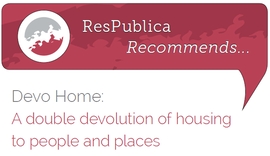Local place partnerships
On 16 June 2015, think tank ResPublica, in partnership with GallifordTry, Peabody, Places for People and Trowers & Hamlins, published ‘Devo Home: A double devolution of housing to people and places’. The paper sets out proposals to tackle the housing crisis through the creation of new local institutions called ‘Local Place Partnerships’ that devolve housing to people and places.
The paper points out that between 1948 and 1978, there were only 8 years in which English local authorities did not build more than 100,000 homes, with a high of 198,000 in 1953, but since 1979 there has been a sharp decline with local authorities delivering fewer than 15,000 homes a year from 1989, and a low of just 50 in 1999. It suggests that the challenge lies in '...delivering new and affordable homes in places where people want to live, where they will flourish, and promote ongoing investment and community engagement.'
The paper suggests that home building could be accelerated by bringing together developers, housing associations, residents, civil society and local businesses to address their concerns and wishes through one decision point, allowing people to take control of housebuilding and shape the future of their neighbourhoods. It argues that this could dramatically increase the supply of new housing.
The paper proposes:
- Citizens should be able to instigate Local Place Partnerships and take control of housebuilding and development in their areas.
- The Homes and Community Agency should transfer surplus public sector land directly to Local Place Partnerships to ensure swift release and efficient use.
- The use of local government pension funds to invest in new homes and development.
- Where appropriate, the creation of cross-development plans that can take a ‘larger than local’ approach to development.
- The use of Local Development Orders to capture the uplift in the value of land and offset the cost of affordable housing and infrastructure projects.
- The use of new technology and methods to engage communities and give them real power over the shape and direction of their areas.
- Quality assurance by the Department for Communities and Local Government.
Director of ResPublica, Phillip Blond, said, “For too long, housing policy has been controlled by Whitehall, and the lack of local authority involvement has been a primary driver behind the failure to build new homes at the scale needed. The only way that we will mitigate the Whitehall ‘command and control’ model, and an old local authority led model is by introducing a new institution that draws a wide range of partners together to coordinate the building of genuinely affordable and aesthetically pleasing homes, and provide the infrastructure needed for communities to thrive.
“Local Place Partnerships can offer the ecosystem of support and single point of decision making needed to ensure the swift delivery of the homes we need.”
Featured articles and news
Call for greater recognition of professional standards
Chartered bodies representing more than 1.5 million individuals have written to the UK Government.
Cutting carbon, cost and risk in estate management
Lessons from Cardiff Met’s “Halve the Half” initiative.
Inspiring the next generation to fulfil an electrified future
Technical Manager at ECA on the importance of engagement between industry and education.
Repairing historic stone and slate roofs
The need for a code of practice and technical advice note.
Environmental compliance; a checklist for 2026
Legislative changes, policy shifts, phased rollouts, and compliance updates to be aware of.
UKCW London to tackle sector’s most pressing issues
AI and skills development, ecology and the environment, policy and planning and more.
Managing building safety risks
Across an existing residential portfolio; a client's perspective.
ECA support for Gate Safe’s Safe School Gates Campaign.
Core construction skills explained
Preparing for a career in construction.
Retrofitting for resilience with the Leicester Resilience Hub
Community-serving facilities, enhanced as support and essential services for climate-related disruptions.
Some of the articles relating to water, here to browse. Any missing?
Recognisable Gothic characters, designed to dramatically spout water away from buildings.
A case study and a warning to would-be developers
Creating four dwellings... after half a century of doing this job, why, oh why, is it so difficult?
Reform of the fire engineering profession
Fire Engineers Advisory Panel: Authoritative Statement, reactions and next steps.
Restoration and renewal of the Palace of Westminster
A complex project of cultural significance from full decant to EMI, opportunities and a potential a way forward.
Apprenticeships and the responsibility we share
Perspectives from the CIOB President as National Apprentice Week comes to a close.






















